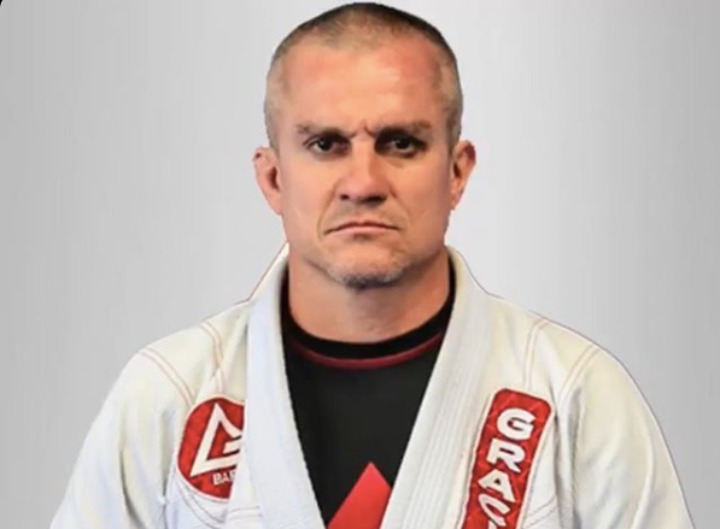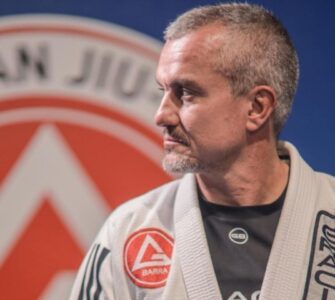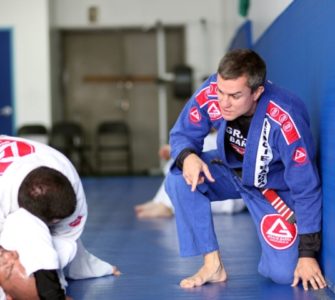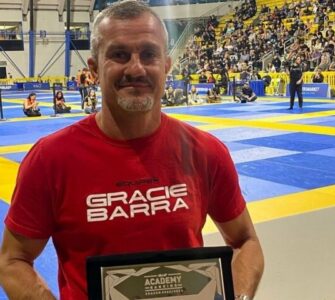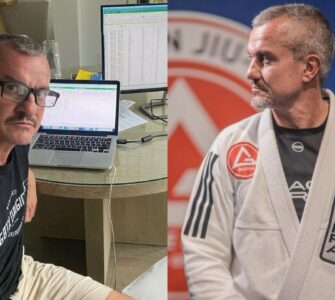Vinicius „Draculino“ Magalhães is a fifth-degree black belt under the legendary founder of Gracie Barra, Carlos Gracie Jr.
A part of the „golden generation“ of BJJ, he has trained with other legends such as Roberto Gordo, Tinguinha, Soneca, Soca and many others. He was also the first person to open a Gracie Barra academy outside of Rio de Janeiro; and is known today as a world-class coach, responsible for developing world-class athletes such as Romulo Barral and Samuel Braga.
We’ve managed to sit down with Draculino himself and hear about his BJJ beginnings, about training in the Gracie Barra’s early days and being a part of the golden generation; as well as about his opinion on those things that successful jiujiteiros and coaches do, which differentiate them from the rest.
BJJEE: Thank you, Vinicius, for partaking in our interview – it is our great pleasure to be talking with you.
To start, would you mind telling us how was it that you found out about BJJ? How did you begin training?
Vinicius: I started training Jiu Jitsu in early 80’s. And, funnily enough, I got to start BJJ because of surfing.
I used to surf and hang out in a place in Rio de Janeiro, called Barra da Tijuca – the name Gracie Barra comes from that. It is a neigbourhood in Rio that is located by the beach and that has really good waves. And I used to hang out there; and some of the people that I hung out with were actually the neighbors of the Gracie family – of Renzo Gracie, Ralph Gracie, Ryan Gracie and their mother, Vera.
And so, there was a bunch of us kids that used to surf and hang out, and the Gracie Barra school was recently opened by Master Carlos Gracie Jr., Crolin Gracie and José Leão Teixeira… His nickname is „Zé Beleza“ and he’s a coral belt now. Besides them, there was another friend of ours from surfing school, called Totila Jordan. His nickname was „Pitoco“ and he was teaching classes in the gym too. He was a purple belt back in the day.
Also, besides the Gracies and Pitoco, there were also Roberto Gordo, Helio Soneca and many others. What I want to say is that everybody used to hang out together and that we all, kind of, belonged to the same crew. And that led me to having my first Jiu Jitsu lesson as a teenager, with Pitoco actually. So, that’s how I started Jiu Jitsu – I was influenced by my environment.
I also came from a judo background, which I trained when I was young… I trained since I was six years old up until around 10 years old. And then, I started again from the age of 11 until 13 years old. And then I stopped – but it helped me a lot in Jiu Jitsu.
BJJEE: So you were off to a good start. But, when did you realize that you wanted to pursue BJJ with more enthusiasm? And what was your training path since you’ve made that decision?
Vinicius: Well, it was after seeing that I had quite a bit of talent that I decided to start training a bit more seriously. I went to the „Club Gracie“, which was the name for Gracie Barra back in the day, and I started taking lessons there. I remember my first teacher there, it was Master Carlos Machado.
When Master Carlos Machado left to the US, then the Master Jean-Jacques Machado started teaching and I became a full time student with him. I trained with him until my purple belt, and then he left to the US as well. And then, I started training full-time with Master Carlos Gracie Jr.
I mean, I always used to train with Master Carlos Gracie Jr., ever since my blue belt, because he was teaching twice a week at the same school. But I was mainly training with Jacques; training sessions with him were on Mondays, Wednesdays and Fridays. But, on Tuesdays and Thursdays I could train with Master Carlos Gracie Jr. for free and I took advantage of that.
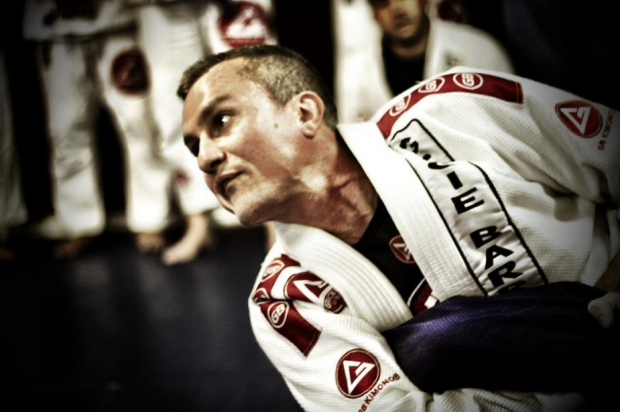
BJJEE: So, you were a part of the Gracie Barra team almost since its beginnings. What are your memories from this „beginning period“ like? In other words, what sticks out most in your mind when you recall on this period of your Jiu Jitsu journey?
Vinicius: Well, yeah, I was there pretty much from the start. The Machado brothers were the main teachers in the beginning, because Master Carlos Gracie Jr. was very engaged on his project… Which was, kind of like having a new farm or a house. So, he wasn’t going to the school all the time. I had a really good relationship with him, but my main teacher was Master Jean-Jacques Machado.
What had happened after Jean-Jacques left was, pretty much, that Master Carlos Gracie Jr. had taken over everybody – over all of the students that were there, both from him and from Machado. And that following period was one of the best memories that I have as a Jiu Jitsu practitioner.
I remember that there was a lot of people on the mats, that the school got really packed. Jiu Jitsu was growing a lot in Rio de Janeiro, especially after the challenge between Jiu Jitsu and Luta Livre. There was a really big explosion of Jiu Jitsu in Rio and eventually in the whole of Brazil as well.
I received a lot of really great lessons and great techniques from Master Carlos Gracie Jr. Some of them are actually the same ones I still use to this day – the same ones that he was teaching every class in the morning and night.
It was amazing. And it wasn’t just the classes by Master Carlos Gracie Jr., but the life lessons as well, the advice that we received when we were sitting at the corners of the mats… That was a really inspiring time that, in my opinion, gave birth for the „golden generation“ of Gracie Barra.
BJJEE: That term – „golden generation“ – is mentioned quite often and for all sorts of BJJ generations. Why do you believe it was exactly your generation that was the golden one?
Vinicius: I know that a lot of people mention that term, and I know that each generation has a lot of its own „golden people“. But a lot of people speak of mine as the golden generation.
You see, all of us were training together and we had a really strong brotherhood. We started getting really, really good results as a team in competitions; and eventually, starting at around 1994/1995, we started being the number one team. We managed to beat the Carlson Gracie team; which was, since the ’80s, practically undefeatable. They used to win every single tournament… It was almost unimaginable to have a team of Carlson Gracie not winning.
And we started changing that with my generation. It was a really, really solid and strong generation that had come after the Machados left to the US.
We had a lot of amazing people. And, I am sure that I am going to forget to mention a lot of them, but these were very well-known names such as the Gracies – Renzo, Ralph, Ryan; but also Roberto Gordo, Roleta, Nino Schembri, Daniel Gracie, Marcio Feitosa – who is one of the biggest champions in Jiu Jitsu history, myself, Soca, Soneca, Maurício Tinguinha…
After that, the second and third generation came with amazing competitors as well… And yeah, there were a lot of great people. We had a really super strong team.
BJJEE: And, looking back at it now, it must have been an amazing feeling for you to be a part of such a strong team, as well as to see it grow through the generations.
Vinicius: Yes, but I witnessed not just the development of the team, but the development of the sport as well. I was also one of the founding members of the CBJJ, which is the IBJJF now, that Master Carlos Gracie Jr. was the president of… So, it was pretty cool to witness the development of not just Gracie Barra, but of the sport itself.
I could not have imagined, even in my wildest dreams, that I would see that which is going on nowadays. To see how big we became, how far we came… As a team, as Gracie Barra is now the biggest team in the world – and the sport of Jiu Jitsu as well.
It’s just unbelievable to witness all of that. I am really proud and happy to be a part of that history.
BJJEE: So, it is fair to say that you have witnessed a lot of changes happening with BJJ over the decades. Would you say that these changes are positive in nature?
Vinicius: Yeah, nowadays it is different from what it used to be, but it is all a part of the evolution. And we have to be willing to embrace the evolution; to be open-minded, to be really grateful for it and respectful.
I am not one of those guys that are, like: „Oh, back in the day it was way better and nowadays everything sucks. These guys aren’t fighters anymore and they are just competitors, they don’t have the samuraity to them…“
I personally think that it is all a part of the evolution of the sport. I think of it as necessary and embrace it. We need to be evolving at all times and that is the way it should be, and that is something that is going to keep on happening.
The reality is that the technical level of today’s Jiu Jitsu is way higher than it used to be. However, people see the old matches and a lot of times think that those ones are more exciting and more realistic, closer to a fight.
But, you have to understand that there were some root changes that were made in the game, in order to preserve the physical integrity of the person. So, nowadays you see some matches that are really sport-oriented. And that is not the fault of competitors at all, it is due to the rules themselves.
And so, some people say that these matches are boring, that nobody wants to go on top, that everybody just gets down to the floor and that nobody does takedowns anymore… But I think it is just an evolution of the sport and that the people play alongside the rules because they want to be champions.
BJJEE: And do you believe that some changes to these rules could be made in order to make Jiu Jitsu „better“?
Vinicius: I think that introducing some smaller changes to the rules would make Jiu Jitsu a bit more exciting, especially looking at it from both a beginner’s standpoint and the sponsor’s one… Because, I think that nowadays some of the matches are really exciting only for those who understand Jiu Jitsu. Other people might not be able to stand and watch what’s going on for 10 minutes.
So, a little change in the rules would be appreciated by everybody, I believe.
BJJEE: Understood. And which other, positive changes do you see happening?
Vinicius: One thing that changed a lot, I believe, is that the sport’s evolution made it possible for a lot of kids to make a living completely out of competing solely in BJJ… There’s some kids that really live off of competitions in grappling and Jiu Jitsu events.
They didn’t need to make a transition to MMA, which was the case before… And, of course, this is still the case nowadays as well; but what’s different today is that you see a lot of professional competitors putting 100% of their efforts into grappling and Jiu Jitsu. And I think that is a really good thing. I also think that the more money there is in events like that, the better it will be for the sport.
However, I think that the main and number one difference is the gift of the Internet. Jiu Jitsu grew way bigger, got way more organized and is spread world-wide nowadays because of it. And that is a great thing.
I really think that we will keep on growing. You can see whole countries where Jiu Jitsu is a mandatory discipline in schools and universities… And for us, coming from a time when BJJ was almost marginalized – when people used to think that we were thugs, that we had a gang mentality, that we were bad guys and when the only press we received was negative press… To witness this is really amazing, and I am very proud to be a part of that.
BJJEE: It’s been quite an exciting journey for you, then! And it’s not only that you’ve seen a lot of things changing; but you have also seen and coached many athletes through the years.
You’ve done this in a rather successful fashion, creating many world-class competitors. What do you believe has made you into such a great coach?
Vinicius: Look, there’s no secret or a magic tool to turning your school into a strong one and having a lot of champions within it.
A little less than a year after I got my black belt, I left to Belo Horizonte to open the first Gracie Barra school outside of Rio. And I was blessed enough to be successful even before going to Belo Horizonte, for I was teaching as a brown belt in a small club in Rio de Janeiro and having already coached some kids that were successful in competition.
And I think that I owe being such a successful coach to having learned the complete system of Jiu Jitsu from Master Carlos Gracie Jr. and from his students who later became teachers as well, like Jean-Jacques Machado.
One of the things that make a difference, for example, is the training regimen. The training regimen in my school in Belo Horizonte is always based on the curriculum of Gracie Barra. I learned Jiu Jitsu from Gracie Barra and we have a Gracie Barra school, so it is only natural that the Gracie Barra curriculum is very strong. We are really big on specific training as well, that makes you particularly good in specific situations.
BJJEE: So, what do you think is most important then for prospective coaches to focus on, if they want to get the best out of their students?
Vinicius: I am really big on getting down and mastering the fundamentals of BJJ. A lot of people think that they know the basics, but they really don’t.
If you have a really solid and complete foundation in Jiu Jitsu yourself, I think that you will be able to expose your students to everything. If you give them the foundations first, then – depending on their body type and physical abilities, as well as on their individual preferences – from there they can start developing their own specialties and a type of the game that they want to have.
I try to expose my students to everything, so that they can then branch out towards that which they prefer.
Samuel Braga is a good example. He is a multiple time world champion, plus he’s the creator of the Berimbolo – since he has always been very flexible, he was able to develop this position from the De la Riva guard and it turned out to be very handy for him. Then, Romulo Barral and his killer spider guard. Erik Wanderley, one of my first World Champions, he has a killer half guard and really, really good pressure… I taught them everything they needed to know in order to have a solid foundation, from which they could, as I said, branch out and do their own thing.
And, also, I think that the most important thing – more than anything – that I owe my success to is that I am able to inspire my students.
I was a good competitor, you know. I wasn’t the number one, but I was among the top competitors in the world in both gi and no gi, and I did have quite a bit of success in tournaments… I don’t even know how many matches I was in. I did Abu Dhabi, I was also in MMA… I’ve pretty much done it all, you know? And I think that experience helps to inspire people to be better.
I really want my students to be better than I am. I think that inspiring them to be better than me, combined with the trust with what I teach them – because of my experience and my results – makes the differentiation between them and other competitors.
There are a lot of great coaches out there who are not successful in competition, and there are a lot of them who are really successful in competition but not that much in coaching. Seeing somebody with a combination of both is really difficult; and I think that, when you see that, you can be certain that you’ll have good success.
BJJEE: And it’s not only the world-class competitors themselves that show your coaching greatness, but the sheer number of people you have promoted to black belt as well – you have more than 500 of them under you.
Which common traits do you see among your most successful black belts?
Vinicius: Actually, it is closer to a thousand (laughs). Sure, as far as the students who are directly under me… I could do a data-check, but I am pretty sure that the number of the ones I have personally promoted is around 500. But then, you have the students of my students, so it all accumulates to around a thousand people. So, underneath me I have almost a thousand black belts – not all of them are directly mine, but some of them are students of my students. And they’re all very tough.
The most black belts that I have are the ones from Belo Horizonte. But I also have black belts from all over the world… On every single continent, spreading Jiu Jitsu and teaching it.
It is very difficult to „measure“ my most successful black belts, sort to speak. For, I have black belts which are really successful in competition and I have the ones that are really successful in professional fighting – in the UFC and similar. Then, I have students which are really successful coaches… And then, I have other students that are really successful in life; who use Jiu Jitsu as a tool to be successful in the path they chose to follow.
So, I think that success can be measured in different ways. But, one trait that I really notice often on my most successful students is, like Master Carlos Gracie Jr. always said – dedication, perseverance and discipline. These beat even the highest of talents; and if you put talent on top of that, then you can conquer the world.
BJJEE: So it is the dedication, perseverance and discipline that will make a big difference. And are there any other things that a jiujiteiro can focus on and do, in order to improve their BJJ outside of the mats?
Vinicius: Yes, one of the questions that people still debate is: what is the best approach to improve your Jiu Jitsu? And let me tell you this – it depends on a lot of factors. There’s no such thing as saying: „Oh, this is the best complementary thing that you can do to help your Jiu Jitsu.“
First of all, to be good in Jiu Jitsu, you have to train Jiu Jitsu (laughs). That’s an obvious one. You cannot neglect it; you have to make Jiu Jitsu your number one physical activity and put the most of your focus into it. But, of course, some other things can help as well.
DVD’s would be great to supplement – and I like to use that word, to supplement – your Jiu Jitsu. Some people like to lift weights and some don’t. Yoga is always a great thing… I’ve never heard anyone say that yoga is a bad thing for Jiu Jitsu. On the contrary, yoga will serve you well.
Surfing is something that a lot of people say is really close to Jiu Jitsu as well.
All in all, I think it depends a lot on the lifestyle of the person, the character of the person, the body type of the person… Their preferences too.
So, I think that you should try and see what works best for you. There’s no magic formula that would say that you should „do this and do that“. There’s no such thing in Jiu Jitsu; you just have to give it a try.
BJJEE: Was there something that you’ve done or practiced yourself, that has elevated your BJJ game to another level?
Vinicius: When I was a high-level competitor, I did high-level conditioning, two or three times a week. Back then I did Jiu Jitsu every single day, even twice a day; that’s how I improved and got better in Jiu Jitsu.
But, then again, some other people trained less and did some other things – and still got better and more successful than I did.
It is hard to tell. But, one thing is for certain: if you want to be better in Jiu Jitsu, then make it a number one priority of yours, in front of all other activities. Not the other way around.
BJJEE: Thank you for your insights, Vinicius. As our last question, we’d like to ask you – what do you think is the most important thing for an up and coming jiujiteiro to develop, if he wants to become one of the best in his gym, city, country or the world?
Vinicius: Nowadays, the difference between the really excellent Jiu Jitsu competitors, the big champions and others, is the mindset. I think that the big champions have a mindset that differentiates them from the rest.
Today, everybody is „tough“. Everybody trains hard, everybody has great technique… Pretty much, all techniques are being spread out in the world by the Internet. Simply, it is very hard to „hide“ techniques nowadays.
So, I think that the mindset of a champion is what makes them into the champions they are.
You see, looking at the history of Jiu Jitsu, you can notice that the biggest champions all had that one trait that is common to all of them… It’s that they believe – and not even in a cocky way – but that they really believe that they are the best in the world. They believe that nobody can beat them. They really believe that nobody, on any given day and in any given competition, will be able to beat them within the Jiu Jitsu rules.
Sometimes they lose, of course. Everyone loses; but they have the mindset of being 100% certain that they cannot be beaten.
And that is a very rare thing for someone to have. Of course, that is because we’re always doubting ourselves, overthinking and sometimes thinking that our opponents are something more than they really are… But, the champions worry more about themselves than about other people.
And, of course, sometimes my students ask me: „Professor, what should I do with this sort of an opponent, what sort of a strategy should I use?“ But, it is way more important to focus on what you are going to do than what the other guy is going to do. If you manage to focus 100% on your game plan and on what you’re going to do, then you have a mindset that will make sure you have more of a chance to win.
I always tell my fighters and competitors to try not to overthink so as to what is going to happen… What’s going to happen is in the hands of God – but you can control what you will do, most of the times.
So, focusing on that is what will give you the edge. When you’ve had good training, when you come from a very technical school, when you’ve had a great coach – and you add this sort of a mindset to it all – then you will most likely be the champion.
BJJEE: Thank you for taking your time to speak with us, Vinicius. It has been our pleasure.
Vinicius: The pleasure is mine, thank you very much.

